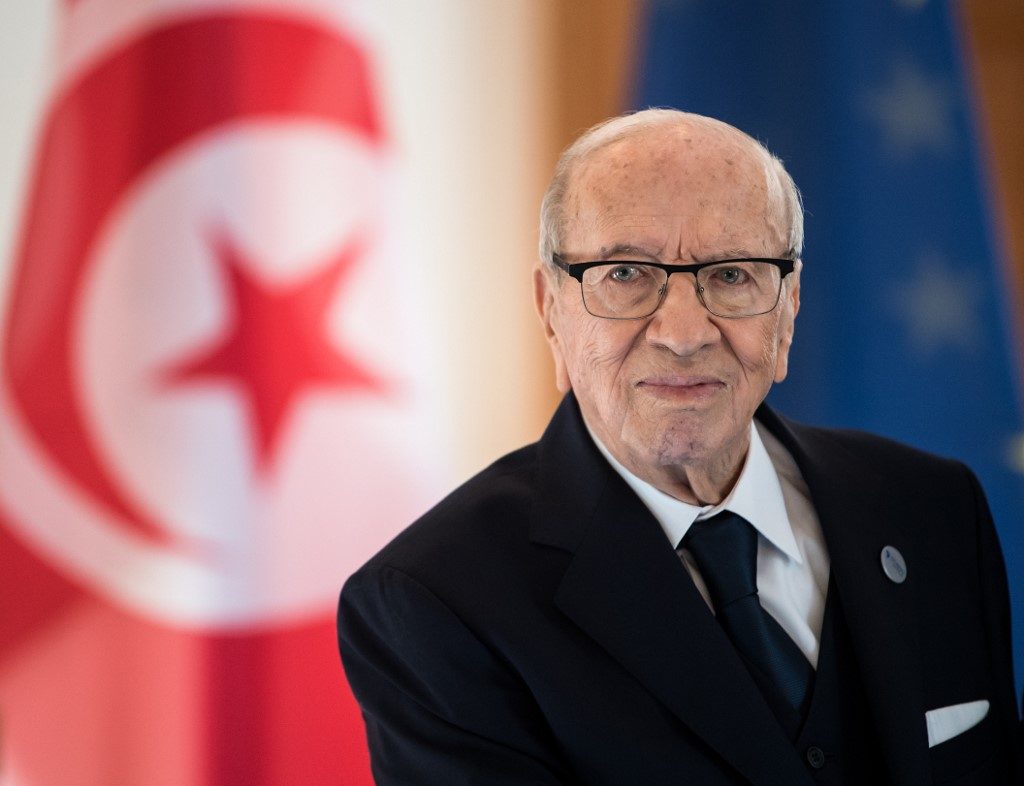SUMMARY
This is AI generated summarization, which may have errors. For context, always refer to the full article.

TUNIS, Tunisia (UPDATED) – Tunisian President Beji Caid Essebsi, the country’s first leader elected in nationwide polls, died Thursday, July 25, triggering political uncertainty ahead of planned elections. He was 92.
The veteran politician, the oldest head of state after Britain’s Queen Elizabeth II, came to power in 2014, 3 years after the Arab Spring uprising toppled longtime despot Zine El Abidine Ben Ali and sparked revolts in several Arab nations.
His death ushers in a period of political transition in the North African nation, hailed as a rare Arab Spring success story.
Essebsi had been hospitalized with a severe illness in late June and was returned to intensive care on Thursday.
“Things are not going well,” the leader’s son Hafedh Caid Essebsi told Agence France-Presse earlier on Thursday after he was readmitted.
German Chancellor Angela Merkel on Thursday called Essebsi “a courageous actor on the road to democracy.” And Italian premier Giuseppe Conte took to Twitter to send his condolences for the passing of a “statesman of great…humanity.”
Just hours after the ailing leader’s death, Tunisia’s parliament announced its speaker would take the reins as interim president.
“Mohamed Ennaceur will take the oath in parliament” at 1500 GMT, vice parliamentary head Abdelfattah Mourou said, adding that under the constitution he was entitled to serve for up to 90 days.
Ennaceur confirmed he would take up the post in an address on state television Thursday afternoon before being sworn in, calling on Tunisians to “unite in solidarity.”
Concerned over a potential power vacuum ahead of the November polls, politicians and social media users had called for greater transparency about the president’s health since he was hospitalized last month.
Jihadist attacks
Tunisia has been hit by repeated jihadist attacks since the overthrow of Ben Ali, raising fears over the country’s fragile democracy and throttling its tourism industry.
In March 2015, jihadist gunmen killed 21 tourists and a policeman at the National Bardo Museum in Tunis.
In June that year, 30 Britons were among 38 foreign holidaymakers killed in a gun and grenade attack on a beach resort near the Tunisian city of Sousse.
In November 2015, a suicide bombing against a bus in the capital carrying presidential guards killed 12. All 3 attacks were claimed by the Islamic State group that prompted a state of emergency that remains until today.
A veteran politician, Essebsi served as an adviser to Habib Bourguiba, the father of Tunisia’s independence from France, holding a number of key jobs under him and later under Ben Ali.
Over the years, Essebsi was director general of the national police and interior minister. He later held the defense portfolio before becoming ambassador to France.
After a subsequent posting as Tunisia’s envoy to Germany, he was named foreign minister.
He also served in parliament, holding the speakership in 1990 and 1991.
He became prime minister after the 2011 uprising and organized parliamentary elections later that year.
Essebsi is the founder and chairman of the secularist Nidaa Tounes (Call of Tunis) party.
Nidaa Tounes won the polls in 2014 and formed a coalition with the Islamist-inspired Ennahdha, which lasted 4 years before the two parties split.
But Essebsi’s party has struggled to overcome bitter internal divisions and to bring Prime Minister Youssef Chahed back into the fold.
Tensions have flared between Chahed and Essebsi’s son, Hafedh, leading to the premier being sidelined from Nidaa Tounes and forming his own rival party, Tahia Tounes.
In April, Essebsi said he did not plan to stand for re-election in polls due to be held in November this year in order to make way for someone younger.
Presidential elections are scheduled for November 17, after parliamentary elections which have been set for October 6.
Essebsi neither rejected nor enacted an amended electoral code passed by parliament in June that would bar the way for several strong candidates.
The restrictions would rule out the candidacy of media magnate Nabil Karoui, charged earlier this month with money laundering, who has formed a political party and stated his intention to stand. – Rappler.com
Add a comment
How does this make you feel?
There are no comments yet. Add your comment to start the conversation.